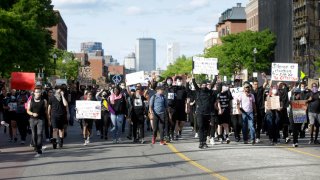
They say sports are a microcosm for life, and here's what sports tell black athletes in America: know your place.
Stand up for the anthem. Are you a patriot or a traitor? Know your place.
Shut up and dribble. You're paid to entertain us, not lecture us. Know your place.
Show up at the White House and smile. Don't you realize it's an honor? Know your place.
Get the latest news and analysis on all of your teams from NBC Sports Boston by downloading the My Teams App
We put black athletes in boxes and then act aggrieved when they want out. And by "we," I mean white owners, players, media, and fans, because this is an "us" problem.
We want sports to be what we want them to be, instead of what they are. Muhammad Ali chose jail over betraying his beliefs and was vilified for it. When Tommy Harper demanded to know how the Red Sox could still accept invitations to the whites-only Elks Club in Florida, he lost his job. Colin Kaepernick took a knee and the NFL sidelined him forever.
Sports are a microcosm, and it's reflected in how we treat black vs. white.
When white athletes visit a divisive president who declared there were fine people on both sides of a Nazi rally, they're patriotic. When black athletes decline, they're militant. It's how armed right-wing protestors can storm the Michigan capital and be treated with kid gloves, while unarmed black protestors in Minneapolis are met with rubber bullets, riot shields, and tear gas.
Sports are a microcosm, and it's about power.
White men own almost every team in America and occupy most front office positions. White fans largely fill our arenas, and white journalists provide most of the coverage. Black athletes are labor, no matter how many jerseys they sell.
LeBron James may be the most popular player in the NBA, but it only took one foray into social commentary for Fox News host Laura Ingraham to admonish him to "shut up and dribble." Golden State's Steph Curry might be No. 2 on that list, and all he had to do was suggest he wouldn't attend the White House to earn a rebuke from the president and right-wing scorn.
When that same president weaponized Kaepernick's decision to take a knee as an assault on patriotism, he made sure to note that players were paid ungodly sums and that they should be grateful, a cruelly malevolent sentiment delivered blithely.
The implication is clear: we decide what you're worth, not you, or your talent, or your hard work. And if we want, we can take it all away. It's the ultimate statement of malicious entitlement. Kaepernick knows. He quarterbacked the Niners to a Super Bowl and then an NFC title game and was out of football two years later.
But it's not as if the black-white divide is merely projected onto sports externally.
Within NFL locker rooms, you can count on one hand the number of white players who knelt alongside their black teammates. Similarly, not a single white Red Sox player declined to visit the White House in support of their black and Latino teammates. Chairman Tom Werner even had the gall to say he didn't see the attendance disparity "as a racial divide," clinging to the notion that baseball is "apolitical."
Perhaps we can finally put such antiquated ideas to rest. Protests over the death of George Floyd, a black Minnesota man who died under the knee of a white police officer, have roiled the nation and exposed smoldering divisions. They've also allowed for a number of athletes to step forward, including Jaylen Brown, Enes Kanter and Marcus Smart of the Celtics.
Brown drove 15 hours to his home state of Georgia to lead a peaceful protest in Atlanta. Kanter drove 15 hours in the opposite direction to do likewise in Boston on Sunday, alongside Smart and teammate Vincent Poirier.
"We want to come out here and let our voices be heard," Smart told NBC Sports Boston's A. Sherrod Blakely. "We stand for truth and we stand for justice, and we won't stop until we get justice."
They know their place, and it's on the front lines. We should cheer them for it, because it's long past time that we shut up and listen.
